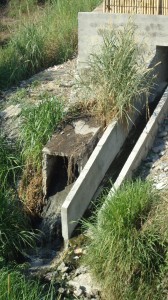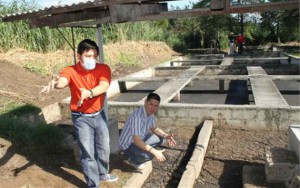By HOMER YABUT and RYAN ELBERT GAN
Holy Rosary Parish – Angeles City and VERA Files

ANGELES, Pampanga—The province of Pampanga is known for good cooks, gourmet delights and a thriving meat processing industry. But residents of Porac town and Angeles City pay a price for this culinary pleasure: They live with the stench of dozens of piggeries that neither the local government nor the environment department could quell.
The foul odor emanating from 13 large-scale and 43 backyard poultry and hog farms worsens when it rains, and has been a problem since the 1970s. Late last year, civil society organizations, the church and residents mounted a protest against the smelly industry, to no avail.
“When we protest, the Department of Environment and Natural Resources comes in and does some monitoring,” said Bishop Pablo Virgilio David, auxiliary bishop of San Fernando and parish priest of the Holy Rosary Parish in Angeles City. “The promise is that they will issue a notice of violation and if the violations are proven, they will file a notice of closure and then the hog raiser will comply for several days. The cycle continues, and it is never ending.”
The Environmental Management Bureau in Region III which has jurisdiction over Pampanga explained that the stench issue in Porac and Angeles City is considered a nuisance and, under the Civil Code of the Philippines, a problem of the local government unit and not the DENR.
“They say we are not doing anything but since 2004, we have already identified the problem and the appropriate solution, but the thing is, it should be the LGU that should play a major part,” said EMB regional director Lormerlyn Claudio.
There has been much fingerpointing over the stench, which actually masks deeper problems. Government agencies concerned have been lax in implementing zoning, land use and environmental laws, and even some businessmen protesting the piggeries have themselves been found violating these laws. Plus, local government units have been slow to respond to complaints, with some piggeries belonging to influential people related to local officials.
Late last year, David, along with businessman Ruperto Cruz who heads the Pinoy, Gumising Ka Movement (PGKM) and the Krusada Kontra Amoy (KKA), led a rally of about 700 residents from Porac and Angeles City.
Most of them wore black and paraded small coffins symbolizing the harmful effects of the farms on the environment. They also condemned government inaction on the issue. The rally paved the way for dialogues and meetings that were held among the farm owners, the government, and those complaining.
David acted as mediator during the dialogues between the farm owners, CSOs and LGUs. Following those talks, steps were taken to address the complaints against the operations of piggery and poultry farms in Porac and Angeles City.
Porac’s problems
One solution was the creation of the Municipal Clean Air and Water Task Force proposed by the Sangguniang Bayan of Porac that would monitor the facilities and management scheme of farm owners to observe closely if their system in controlling waste water was in accordance with the law.
Inspections of the farms by the EMB revealed violations. In a letter Claudio sent to Porac Mayor Condralito Dela Cruz last December, as a result of their earlier efforts in monitoring the 13 large-scale piggery and poultry farm operations within the town, seven of the farms had been issued Notices of Violation (NOV) for violating the Clean Water Act of 2004 and some conditions stipulated in their Environmental Compliance Certificates (ECCs).
Following due process, the farm owners were given adequate time to comply and improve their pollution control facilities and housekeeping.
The hog raisers of Porac, for their part, requested the municipality to temporarily stop the ongoing farm inspections asking to be notified of the task force’s objectives, guidelines, parameters and time frame first. After clarifications were made, the monitoring continued.
Porac used to be a rural town with a small population. Soon enough, “people started investing in hog raising in some barangays where there were very few residents,” David said.
But as the population grew and rural areas became built-up communities, the local government failed to reclassify the zones as residential. Once the LGU declares that an area is residential, piggeries can be ordered to close down, David said.
“After a while you get used to it, but it still stinks. So we just cover our noses when we smell the stench,” said Paul Manaloto, a student of a Catholic school in the area.
“Our relatives refuse to visit us here because they can’t stand the odor,” said Aling Cora lives in Barangay Sta. Cruz in Porac.
Angeles City
In Angeles, the Pampanga-Angeles Livestock Growers Association wrote to David in October to denounce Cruz’s participation in the anti-piggery rallies and claimed he was staging black propaganda against them, and that he himself was guilty of environmental violations.
The EMB confirmed Cruz had constructed a golf course four years ago without notifying the DENR, which found violations by the golf course operator during their inspections of farms in the nearby area. As a result, Cruz was also given a notice of violation.
“We went through the records and we found out that he (Cruz) also had plenty of violations. Under the Environmental Impact Assessment (EIA) system, a golf course is classified as an environmentally critical project. Had he disclosed it before, he would not have been allowed to put it up because Paradise Farms had preceded him in the area,” said Claudio.
Paradise Farms is one of the biggest livestock farms in Angeles City which is registered under Robin Nepomuceno, brother of former Angeles City mayor and congressman, Blueboy Nepomuceno.
Claudio also said the inspection done on Cruz’s golf course was part of the standard operating procedure the EMB had to follow as they monitored the farms. “It just so happened that his business is in the vicinity area that is why it was checked as well,” he said.
The farm owners explained that they have modernized their operation by adopting new technologies such as manure separators, biogas digesters, and other facilities to improve the efficiency of their waste water treatment facilities to conform with the standards set by DENR-EMB and the municipal sanitary offices.

Large-scale hog raisers are also putting the blame on backyard piggeries that are said to be the ones not complying with environmental standards. From the monitoring done by DENR-EMB, 43 livestock farms were found to be lacking their ECC and discharge permits. These backyard piggeries were ordered to cease operation until they are able to complete their requirements.
Seeking solutions
Affected sectors are asking why no concrete and long-term solutions are being done to end the stench issue altogether.
One question that many people is deciding whose rights should be given priority: those of the residents or the hog raisers.
It is also common knowledge that one of the industries Pampanga is known for is meat processing. With a number of companies in this line of business like Pampanga’s Best, Mekeni, and Ariel’s Meat Products, the closure of the piggeries would be detrimental to the industry.
PGKM also asserted that EMB only goes after small-time farm owners and turns a blind eye to large-scale farms that hold a population of about 1,400 to 24,000 pigs, which remain in operation. EMB refuted this allegation, saying it had inspected all the farms in the area—both large-scale and backyard.
Another would be the lack of proper equipment and manpower of EMB Region III. Since the main issue would be the foul odor from the farms, David suggested that to really measure the amount of air contaminated, the EMB needed to use an olfactometer, an instrument used to detect and measure ambient odor dilution. It can also help in determining the tolerable level of smell for humans.
The bishop also cited a laboratory in Clark that can measure liquid and gaseous emissions. The device can measure if an emission is causing damage to the environment and crossing the threshold levels.
EMB, however, regards the problem as a matter of odor nuisance and land use but that the resolution rests on the LGU’s shoulders
Short- and long-term solutions in addressing the problem were also suggested by the LGU and EMB. Some of these solutions would be the establishment of an agro-industrial zone as relocation site for the piggery farms and the approval of a resolution on the land use and zoning plan for Porac.
Claudio said, “We found out that Porac has no Comprehensive Land Use Plan (CLUP). Supposedly, under the law, the LGU should have a CLUP—and that CLUP should be approved by the provincial government and further approved by the Regional Development Council.”
Angeles City, on the other hand, had already acted to resolve this case. Based on the letter that the city government sent to EMB early this year, the city already passed a resolution and ordinance regulating the farms.
“On the land use, the Angeles City government told us, they would give the farms a certain number of before they are close. This shows that they have the power. But Porac has no CLUP,” said EMB’s Reynaldo Garcia.
The time frame given to the farms in Angeles City is for the farm owners to be able to get back the investment they had made in putting up their businesses. After the said deadline ranging from two to three years, the farms will be ordered closed because they don’t fall under the city’s land use needs.
In the meantime, residents are considering filing a writ of kalikasan against the local government if it refuses to act on their complaints.
(This article is part of the VERA Files project “Human Rights Investigations” supported by the British Embassy. The audio slideshow was produced as part of the training course, “Thinking Beyond Stills: A multimedia course for photojournalists,” by VERA Files, in partnership with the Canadian Embassy.)
